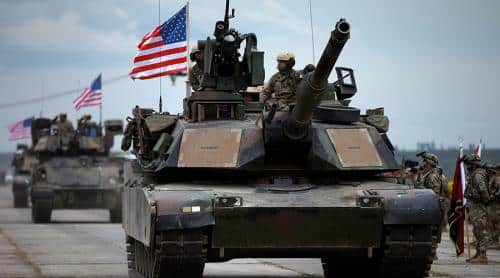
The US is casting its net over the desert between Iraq and Syria, Saudi Arabia and Jordan to install military bases and power-structures that will guarantee major influence in the area for the foreseeable future. A part of that plan is to develop Sunni proxy forces that will keep the government forces of Damascus and Baghdad out of the area. Another part is to privatize important infrastructure to keep it under direct US control.
To privatize the Iraqi Highway 1 between Baghdad and the Jordanian capital Amman, is a major point in these plans. According to the NYT:
As part of an American effort to promote economic development in Iraq and secure influence in the country after the fight against the Islamic State subsides, the American government has helped broker a deal between Iraq and Olive Group, a private security company, to establish and secure the country’s first toll highway.
This map shows Highway 1 from Baghdad to Amman. Notice the road junction east of the Jordan-Iraq border. There the road splits with one branch going north-west towards Damascus. The point where that road crosses from Iraq to Syria is the al-Tanf border station currently occupied by US forces and their British and Norwegian auxiliaries as well some Syrian “rebels” under US control. The US recently bombed a convoy of Syrian and allied Iraqi forces which was moving towards that area. The U.S. military dropped leaflets to Syrian troops to order them to stay away from their own border. Who do those US troops think they are? What is there justification to be there in the first place? Large Iraq and Syrian government forces are now moving towards al-Tanf from the two sides of the border to evict the occupiers. Iraq, Syria, Iran and Russia have agreed that no U.S. position will be tolerated there. US and other foreign troops will either move out voluntary from al-Tanf or they will be removed by force.
Highway 1 and its branch to Damascus is the most important economic lifeline between Syria and Jordan in the west and Iraq and beyond in the east. Whoever controls it, controls major parts of commerce between those countries. Iraq is a country with rich resources. While it is under economic strains after decades of US sanctions and war against it by the US and Takfiri proxy forces it has no long-term need to rent out such major real estate.
Nevertheless the current Iraqi government under Prime Minister al-Abadi signed a preliminary agreement for a 25 year contract with the U.S. company:
Mr. Abadi has awarded the development project to Olive Group, although the final details are still being worked out. The project would include repairing bridges in western Anbar Province; refurbishing the road, known as Highway 1; and building service stations, rest areas and roadside cafes. It would alsoinclude mobile security by private contractors for convoys traveling the highway.
Al Abeidi is now under pressure from the Shia majority who elected him into office to renounce the deal. It is obviously that the deal is not in their interest nor that of the country. According to US diplomats one purpose of the deal is:
pushing back on the influence of Shiite Iran, whose growing power in Iraq has alarmed important Sunni allies of the United States like Saudi Arabia and Turkey.
Iran has little to do with the road. It is the Shia majority of Iraq that would benefit most from free flowing traffic and commerce on it.
Turkey and Saudi Arabia have enabled the Sunni insurgency in Iraq of which ISIS is just the latest incarnation. To allow the US to control the road and thereby Anbar province in the name of Turkey and Saudi Arabia would guarantee that future Sunni insurgencies could threaten Baghdad whenever “needed.” Just remember how Obama said he used ISIS to throw then Prime Minster Maliki out of office:
The reason, the president added, “that we did not just start taking a bunch of airstrikes all across Iraq as soon as ISIL came in was because that would have taken the pressure off of [Prime Minister Nuri Kamal] al-Maliki.
A US controlled west-Iraq and south-eastern Syria would be a highway for Saudi Arabian miscreants from their country up towards Baghdad and Damascus. It would be an incarnation of the “Salafist principality” the U.S. and other early ISIS supporters have wished for since at least 2012.
The US is willing to obfuscate and to lie to further its imperial plans. The NYT is, as usual, complicit in that:
Playing on painful memories and fears of Iraqis, news outlets have also run false reports that Blackwater — the private security firm that acted with impunity in the early days of the American occupation and gunned down innocent Iraqis in Baghdad’s Nisour Square in 2007 — had taken on the project.
“The politics of this country are challenging,” said Christian Ronnow, executive vice president of Constellis, the parent company of Olive Group, a private security firm that has worked for years in Iraq.
What the NYT claims are “false reports” are in fact reasonable conclusions:
The [Constellis] Group combines the specialized skills and operational excellence of ACADEMI, Edinburgh International, Strategic Social and Triple Canopy,
is an American private military company founded in 1997 by former Navy SEAL officer Erik Prince as Blackwater, renamed as XE Services in 2009 and now known as Academi since 2011 after the company was acquired by a group of private investors.
Olive Group is Constellis Group is Academi is Blackwater – the “false reports” in Iraqi media are way more truthful on that than the NYT is.
The US project in Anbar province and its potential control of Highway 1 through private US forces threatens to put an economic stranglehold on Iraq, Syria and Jordan. I trust that nationalist forces in those countries as well as their allies will do their best to prevent it.
Reprinted with permission from Moon of Alabama.

